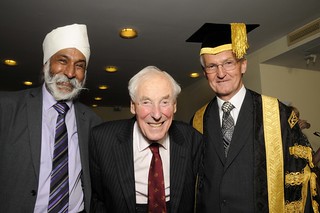
Sir Adrian Cadbury, pictured in July 2013, following an Aston University graduation ceremony at the Town Hall, Birmingham, and flanked by Dr Sarindar Singh Sahota and Sir John Sunderland (Chancellor of the University).
Sir Adrian Cadbury died last Thursday. He was 86. He led a full life, a remarkable life, a good life. Obituaries have appeared in several newspapers, including The Guardian, The Daily Telegraph, The Times and Financial Times. The Times obituary has a striking photograph of Adrian as a young man and athlete, taken in 1952 when he represented Great Britain at the Helsinki Olympic Games.
I first met Adrian much later in his life, about ten years ago. I had started teaching at Aston University and had created a new course in corporate governance; he had recently stepped down as Chancellor of the University, a position he held for 25 years. Would he, I wondered, be prepared to come and speak to my students about his chairmanship of the Cadbury Committee? Yes was his answer but he gave much more: for several years he came to many of the classes, describing his role – with typical humility and humour – as that of a teaching assistant.
The students warmed to him immediately. He put me at ease and was very supportive. He would, for example, find a way to agree with something that I had said when contributing to lectures and answering questions. If a student arrived a little late, Adrian would be the first to get up from his seat and make sure they had the lecture materials. Together we listened to student presentations on governance frameworks across the world, often learning of the influence of the Cadbury Committee’s Report and Code. Adrian always spoke of the Committee’s work collectively – we, not I – but I wonder if, with a different chairman, the Committee’s work would have had the impact that it did.
In the last lecture that Adrian attended, the students presented him with an album containing hand written messages and copies of some of the photos they had taken of themselves with him: a tangible record of their appreciation for a man who, in listening, speaking and engaging with them, had enriched their lives. I was touched when, a little later, he wrote to describe the fun he had had taking part. He had done more than share his knowledge and experience. We learned much from his tone, demeanour and actions: the effort he took in learning individuals’ names, regardless of their place or position; his genuine interest in the students’ academic and wider university experience; the delight he took in sharing his knowledge.
Working with Adrian was a privilege. I will remember, in particular, his humility, his laugh and his ability to inspire others to do their best. He recognised the contribution that everyone was capable of making and will, of course, be remembered for his contribution to the field of corporate governance. The less well known is no less significant. Few probably know the full extent of his public service and charitable work. Much was done in a quiet way across Birmingham, the West Midlands and further afield. Recognition came more publicly and I was pleased that Adrian was able, earlier this year, to receive in person the membership badge of the Order of the Companions of Honour from The Duke of Cambridge at Buckingham Palace.

3 comments:
Sir Adrian Cadbury was a truly inspirational person: a man who had time for others who was polite, courteous and immensely talented.
He could be described as the "father-figure" of corporate governance in the UK heightening awareness of this concept which was virtually non-existent before the 1990s.
The Cadbury Report in 1992 became the leading work on corporate governance and is still quoted in many articles and books internationally.
He will be deeply missed but a person who made an indelible mark in many ways.
He is actually an inspirational leader whose memory will ever remain,especially through his works and books.
I totally agree.
Post a Comment